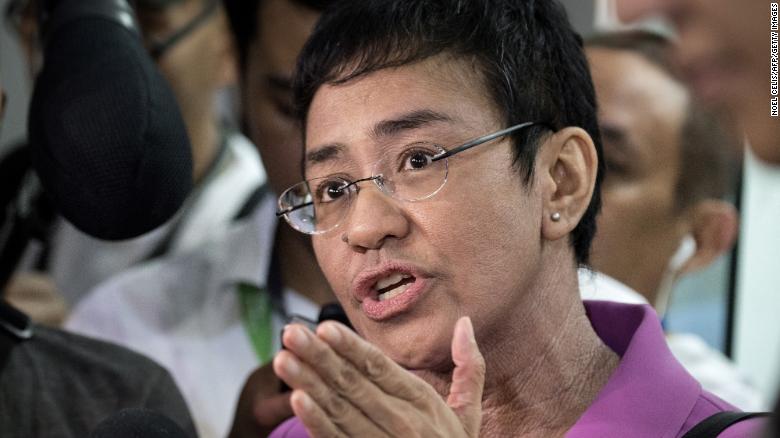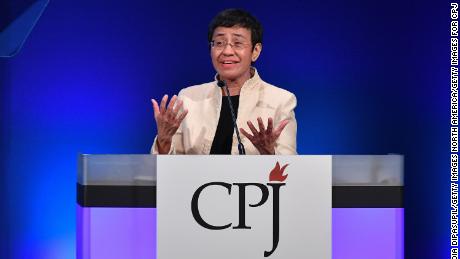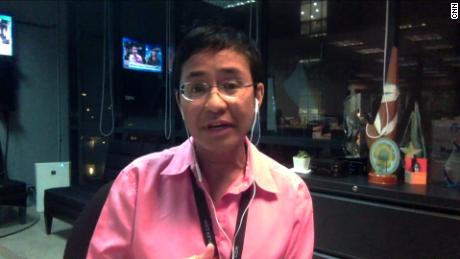(CNN)Award-winning journalist Maria Ressa has been indicted for a second time, in a move widely criticized by rights groups as an attempt to stifle press freedoms in the Philippines.
Ressa, who is the founder and editor of online news outlet Rappler, is currently out on bail following tax evasion charges filed against her in November, which critics say are politicallymotivated.
She now faces "cyber libel" charges over an article published in 2012.
Amnesty International labeled the latest indictment, filed earlier this week, as "yet another absurd legal attack" on the Rappler news outlet, adding that the charges amounted to "harassment" but came "as no surprise."
Rappler has become an indispensable source of information in the Philippines in recent years, owing to its unflinching coverage of the country's President Rodrigo Duterte and his brutal war on drugs.
The legal case against Ressa comes at a time when press freedoms are being challenged both in the Philippines and around the world.
In 2018, Ressa was named among a group of journalists as Time magazine's Person of the Year.
Others in the group included Jamal Khashoggi, the Washington Post contributor who was killed at the Saudi Arabian consulate in Istanbul in October, and Wa Lone and Kyaw Soe Oo, two Reuters journalists who were arrested a year ago in Myanmar while investigating the mass killings of Rohingya Muslims.
'Attacks on independent journalists'
The latest law suit against Ressa relates to a story written in 2012 by journalist Santos Jr, who is also indicted along with Rappler Inc.
The article linked prominent businessman Wilfredo Keng to one of the country's top judges during his impeachment trial.
The cyber-libel law, however, was enacted in the Philippines after the original article was published.
In January, the country's National Bureau of Investigation ruled that because the report preceded the law, Ressa could not be charged. The Department of Justice has now over-turned that ruling on the grounds that the news article was updated in February 2014.
Ressa said that the charges "highlight the political nature of these attacks against independent journalists like me and news groups like Rappler."
"The law is being weaponized in an attempt to control the public narrative," she added. "We will not be intimidated and will continue to shine the light on actions of impunity."
Journalist advocacy group Reporters Without Borders also condemned the move in a tweet.
"The judicial harassment used by (the) Duterte government to persecute Rappler and Maria Ressa is grotesque. It'd be almost laughable if it weren't for the terrible judicial precedent that this decision would set, if upheld," the organized wrote.
The National Union of Journalists of the Philippines (NUJP) called the enshrining of electronic libel "an institutionalized threat to free expression, especially in the internet age," given the ease of which information is shared online.
A sustained legal attack
Both Rappler and Ressa were formally indicted on multiple counts of tax evasion last November. At the time, Ressa presented herself to court with a bail application, that was approved.
Those formal accusations bring with them a potential 10-year prison term under Philippines tax law.
Duterte's office has denied he is involved in the prosecutions against Rappler, but the President has previously sparred with the company's employees, personally barring Ressa and reporter Pia Ranada from Malacanang Palace, his official residence, over their coverage of his administration.
In a press conference Monday, Philippine presidential spokesperson Salvador Panelo denied that the charges against Ressa and Rappler were politically motivated.
"It's a question of tax evasion. You violate tax laws and then you'll be prosecuted," he told reporters, according to Rappler. "We have repeatedly said that we've never and will never interfere with the function of the judiciary. If the judiciary finds probable cause, then we'll have to respect the law on the matter. Ms. Ressa is entitled to legal remedies under the law."
Brad Adams, Asia director for Human Rights Watch, earlier said the case sent "a chilling message to journalists and human rights activists (in the Philippines) that they will be targeted for exposing his murderous campaign."









